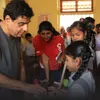Dell Technologies, Atal Tinkering Labs bring digital innovation to India’s underserved communities
Dell Technologies has partnered with NITI Aayog's Atal Tinkering Laboratories (ATL) to conduct various programmes with students to improve their digital knowledge to build innovative solutions.
Today, in India, technological advancements have opened up new avenues for strong economic growth, innovation, and job creation. However, the country needs a robust digital skills ecosystem to keep up with its rapid advancement and close the digital divide.
Since 2017, Dell Technologies and NITI Aayog's Atal Tinkering Laboratories (ATL) have partnered to equip students from underserved communities with the technological skills required for the future.
Under this partnership, Dell has implemented the programme in various state and federally-funded educational institutions, fostering innovation and assisting students in using disruptive technology to solve real-world issues.

According to a NASSCOM report, the demand for digital skills in India is 8X higher than what is available, and this gap is expected to grow.
“As India further develops as a digital economy, healthy collaboration among communities, states, and local governments will play a key role in maximising the full potential of technology,” says Archana Sahay, Regional Giving Manager, Asia Pacific and Japan (APJ), Dell Technologies.
She adds, “Our partnership with NITI Aayog and Atal Innovation Mission is an example of how collective action can effectively bridge the digital divide in India.”
At present, these initiatives are available across Delhi, Maharashtra, Karnataka, Andhra Pradesh, Telangana, Himachal Pradesh, and Uttarakhand in over 250 ATLs.
“We are using our position as a technology leader, our established relationships with global non-profits, customers, and partners combined, with the scale of our team members to connect everyone to the digital economy,” she adds.
Bridging the digital divide
According to Archana, Dell’s CSR contribution in India is built on connecting underserved and under-represented groups to skills and resources, delivering the benefits of technology to all.
This partnership has launched three programmes—Gaming Solution, Student Entrepreneurship, and SheCodes Innovation—to help students develop skills including creativity, critical thinking, problem-solving, and entrepreneurship, among others.
The Gaming Solution programme is an open-source self-learning portal for students who can sign up for beginners, intermediate, or advanced game development courses.
The portal makes learning fun by using videos and case studies to teach the modules, and students can access all the resources required to become game developers on it.
In fact, these courses are aligned with each school’s curriculum and are available at all ATL schools across India.

From one of the ATL classrooms
The Student Entrepreneurship Programme (SEP)—a 10-month programme conducted annually—helps students gain a proper understanding of business, product development, product expansion, etc.
“We work closely with our implementation partner, Learning Links Foundation, to help students from planning to the execution stage. It also provides students with an opportunity to intern at Dell and be mentored by Dell employees,” she says.
During the internship, students are exposed to business communication, inclusion and integration, customer-centric thinking, customer testing, feedback loop, patenting, and product development through experiential learning.
The SheCodes Innovation programme targets ATL schools at the grassroots level and encourages girls to pursue careers in STEM.
The programme aims to inspire girls as young as 11-years-old to experiment with advanced technologies. They are also mentored by subject matter experts, including Dell employees, who help them thrive in a cohesive environment.
Impact created
Archana says, “While our Gaming Solution programme reached two million students across India, others like SheCodes, SEP programmes, and Community Makerspace helped establish 55 market viable products and 28 patent applications.”
Community Makerspace promotes inclusion in innovation by leveraging technology to educate and empower communities. The programme aims to expose students to cutting-edge scientific knowledge and exciting new projects in ATL schools across India.
“The products were developed with support from volunteers of Learning Links Foundation and Dell Technologies, who also provided funding support for product development and patenting,” she adds.
Under the SEP programme, Advaith, an 18-year-old boy from Hyderabad, created FarmTech, an IoT-based solution that acts as a personal assistant for farmers.
With the help of two friends, he built a tool that allows farmers to remotely monitor and regulate fields by properly gathering and utilising data. It also assists farmers to take important decisions by providing data on irrigation, soil type, weather forecasts, etc.
The product has received great traction in the market for its high degree of customisation. The team foresees a huge market and aspires to sell its product to over two crores (20 million) of small, medium, and large-scale farmers in the next five years.
Two girls from Amravati—Divyani Raut and Anjali Paunikar—built an affordable and effective solution for the long-existing problem of poor-quality drinking water in their village.
Under the SheCodes programme, they designed a real-time Water Quality Analysis System using Arduino, C-language programming, and IoT.
In the system, the sensors rapidly read the pH value, turbidity, and level of TDS (Total Dissolved Solids) of the water sample, while IoT transfers data to the phones of the village headman (sarpanch) and district officials.
Archana says, “FarmTech and Arduino-based Water Quality Analysis System are excellent examples of how young minds can solve some of our country’s most pressing problems. We are honoured to be a part of their journey, and we will continue to promote entrepreneurship and innovation.”
Edited by Suman Singh








